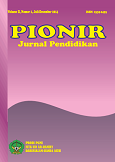MERDEKA CURRICULUM AT SDIT IRSYADUL ‘IBAD FROM THE PERSPECTIVE OF RECONSTRUCTIONISM PHILOSOPHY
DOI:
https://doi.org/10.22373/pjp.v14i1.26693Keywords:
Independent Curriculum, Philosophy Of Education, Reconstructionism.Abstract
The Independent Curriculum is a development of the K13 curriculum that focuses on developing students' talents, potentials, and interests by digitizing learning with technology. This curriculum begins the Society 5.0 era, where technology dominates. The Independent Curriculum consists of four schools of educational philosophy, each of which has a different way of building a curriculum. One of them is the Reconstructionist philosophy. To find out what dominates the philosophy of education, the development of the independent curriculum must be reviewed from a Reconstructionist perspective. This will make it possible to determine the basis of the curriculum and its results. A qualitative method was used in this study. The primary source of this study came from scientific literature, while secondary sources came from supporting sources such as essays, papers, and interview results with teachers. The results of the study show that reconstructionism is an important component in changing the SDIT Irsyadul Ibad curriculum to the Independent Curriculum. Keyword: Independent Curriculum, Philosophy Of Education, Reconstructionism.References
Amin Putri, R. K., & M Yunus Abu Bakar. (2023). Konsep Essensialisme Dalam Perspektif Filsafat Pendidikan Islam. Dirasah : Jurnal Studi Ilmu Dan Manajemen Pendidikan Islam, 6(1), 112–124. https://doi.org/10.58401/dirasah.v6i1.752
Assyakurrohim, D., Ikhram, D., Sirodj, R. A., & Afgani, M. W. (2022). Case Study Method in Qualitative Research. Jurnal Pendidikan Sains Dan Komputer, 3(01), 1–9.
Dalmeri, D. (2014). Pendidikan untuk Pengembangan Karakter (Telaah terhadap Gagasan Thomas Lickona dalam Educating For Character). Al-Ulum, 14(1), 271.
Hafidh, M., Yulia, G., R, F. Y. A., & Anggraeni, A. (2023a). Evolusi Teknologi dalam Pembelajaran menurut Pandangan Aliran Filsafat Rekonstruksionisme. Jurnal Pendidikan Tambusai, 7, 24467–24473.
Hafidh, M., Yulia, G., R, F. Y. A., & Anggraeni, A. (2023b). Evolusi Teknologi dalam Pembelajaran menurut Pandangan Aliran Filsafat Rekonstruksionisme. Jurnal Pendidikan Tambusai, 7, 24467–24473.
Maksum, K. (2021a). Democratic Education in “Merdeka Belajar” Era. Progres Pendidikan, 2(2), 107–114. https://doi.org/10.29303/prospek.v2i2.144
Maksum, K. (2021b). Democratic Education in “Merdeka Belajar” Era. Progres Pendidikan, 2(2), 107–114. https://doi.org/10.29303/prospek.v2i2.144
Mazumdar, S. (2021). Education and Social Change: The Basis of Evolution and Development of a Contemporary Society. International Journal of Multidisciplinary Research and Analysis, 04(09), 1303–1310. https://doi.org/10.47191/ijmra/v4-i9-16
Mubin, A. (2018). Pengaruh Filsafat Rekonstruksionisme Terhadap Rumusan Konsep Pendidikan Serta Tinjauan Islam Terhadapnya. Rausyan Fikr : Jurnal Pemikiran Dan Pencerahan, 14(1). https://doi.org/10.31000/rf.v14i1.681
Mutaqin, Z., & Iryana, W. (2018). Perubahan Sosial Budaya Masyarakat Kasepuhan Adat Banten Kidul-Kabupaten Sukabumi. Religious: Jurnal Studi Agama-Agama Dan Lintas Budaya, 2(2), 92–106. https://doi.org/10.15575/rjsalb.v2i2.3098
Nikma, S., & Rozak, A. (2023a). Kurikulum merdeka dalam tinjauan filsafat pendidikan. Qiro’ah: Jurnal Pendidikan Agama Islam, 13(1), 36–48.
Nikma, S., & Rozak, A. (2023b). Kurikulum merdeka dalam tinjauan filsafat pendidikan. Qiro’ah: Jurnal Pendidikan Agama Islam, 13(1), 36–48.
Pratama, R., & Nursikin, M. (2024a). SOSIAL DALAM FILSAFAT PENDIDIKAN. 06(04), 939–959.
Pratama, R., & Nursikin, M. (2024b). SOSIAL DALAM FILSAFAT PENDIDIKAN. 06(04), 939–959.
Pujawardani, H. H., Hasan, M., & Saefurridjal, A. (2023). Implikasi Paradigma Aliran-Aliran Filsafat Terhadap. KOMITMEN: Jurnal Ilmiah Manajemen, 4(1), 209–224.
Puspitasari, I., Surbakti, A., & Darmayanti, N. (2023). Students’ Moral Intelligence in the Perspective of Peer Interaction and Self Esteem. Psikostudia : Jurnal Psikologi, 12(4), 482. https://doi.org/10.30872/psikostudia.v12i4.11868
Qomariyah, N. (2017). Pendidikan Islam Dan Aliran Filsafat Pendidikan Rekonstruksionisme. Al-Falah: Jurnal Ilmiah Keislaman Dan Kemasyarakatan, 17(2), 197–217. https://doi.org/10.47732/alfalahjikk.v17i2.23
Ramadani, I. R., Firman, F., & Ahmad, R. (2021). Basic concepts and curriculum theory in education. SCHOULID: Indonesian Journal of School Counseling, 6(1), 9. https://doi.org/10.23916/08741011
Rois, Y. A., Putri, M. M., & Fatmawati, E. (2024). Implikasi Pendekatan Filsafat Rekonstruksionisme terhadap Tujuan Pendidikan. 3.
Shodiq, S. F. (2017). Pendidikan Karaktermelalui Pendekatan Penanaman Nilai Danpendekatan Perkembangan Moral Kognitif. At-Tajdid : Jurnal Pendidikan Dan Pemikiran Islam, 1(01), 14–25. https://doi.org/10.24127/att.v1i01.332
Tembang, Y., Sulton, & Suharjo. (2017). Peningkatan Motivasi dan Hasil Belajar Melalui Model Pembelajaran Think Pair Share Berbantuan Media Gambar di Sekolah Dasar. Jurnal Pendidikan: Teori, Penelitian, Dan Pengembangan.
Undari, M., & Desyandri. (2022). Pandangan Aliran Rekonstruksionisme Terhadap Gaya Belajar Dalam Penerapan Kurikulum Merdeka. Pendas : Jurnal Ilmiah Pendidikan Dasar, 7(2), 1252–1261.
Vhalery, R., Setyastanto, A. M., & Leksono, A. W. (2022). Kurikulum Merdeka Belajar Kampus Merdeka: Sebuah Kajian Literatur. Research and Development Journal of Education, 8(1), 185. https://doi.org/10.30998/rdje.v8i1.11718
Wang, D., & Zuo, Y. (2023). Study on the Cultivation of Cognitive Strategies for Junior High School Students from the Perspective of “Viewing” Ability. Journal of Education and Educational Research, 6(2), 123–129. https://doi.org/10.54097/jeer.v6i2.14975
Yusuf, M., Somadi, F., Haris, A., & Anwar, R. (2023). Aliran Filsafat Pendidikan Barat: Sebuah Telaah Pustaka. Attractive : Innovative Education Journal, 5(2).
Downloads
Published
Issue
Section
License
- Authors retain copyright and grant the journal right of first publication with the work simultaneously licensed under a Creative Commons Attribution License that allows others to share the work with an acknowledgment of the work's authorship and initial publication in this journal.
- Authors are able to enter into separate, additional contractual arrangements for the non-exclusive distribution of the journal's published version of the work (e.g., post it to an institutional repository or publish it in a book), with an acknowledgment of its initial publication in this journal.
- Authors are permitted and encouraged to post their work online (e.g., in institutional repositories or on their website) prior to and during the submission process, as it can lead to productive exchanges, as well as earlier and greater citation of published work (See The Effect of Open Access).

